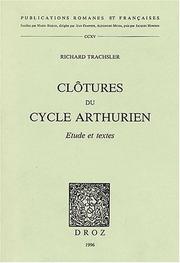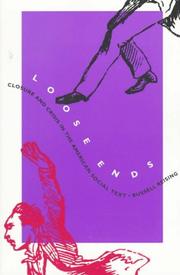| Listing 1 - 3 of 3 |
Sort by
|
Book
ISBN: 0801851939 Year: 1996 Publisher: Baltimore ; London Johns Hopkins University Press
Abstract | Keywords | Export | Availability | Bookmark
 Loading...
Loading...Choose an application
- Reference Manager
- EndNote
- RefWorks (Direct export to RefWorks)
Poetry --- Comparative literature --- Literary rhetorics --- Closure (Rhetoric) --- Conclusion (Rhétorique) --- Endings (Rhetoric) --- Last lines (Rhetoric) --- Peroratie --- Peroration --- Poetics --- Poétique --- Poëtica --- Péroration --- Slot (Retoriek) --- Poetics. --- Closure (Rhetoric).

ISBN: 2600001549 9782600001540 Year: 1996 Volume: 215 Publisher: Genève: Droz,
Abstract | Keywords | Export | Availability | Bookmark
 Loading...
Loading...Choose an application
- Reference Manager
- EndNote
- RefWorks (Direct export to RefWorks)
Arthur [Cycle d' ] --- Arthurian romances --- Arthurromans --- Cycle arthurien --- Cycle d'Arthur --- Cycle de la Table ronde --- Romans arthuriens --- Romans bretons --- Romans de la Table ronde --- Table ronde [Romans de la ] --- Knights and knighthood in literature --- Closure (Rhetoric) --- History and criticism --- 82-39 --- -Closure (Rhetoric) --- Endings (Rhetoric) --- Last lines (Rhetoric) --- Peroration --- Rhetoric --- Romances --- Graallegende; Arthurroman --- 82-39 Graallegende; Arthurroman --- Arthurian romances - History and criticism

ISBN: 0822318911 9780822318910 Year: 1996 Publisher: Durham, N.C. Duke University Press
Abstract | Keywords | Export | Availability | Bookmark
 Loading...
Loading...Choose an application
- Reference Manager
- EndNote
- RefWorks (Direct export to RefWorks)
In this study of American cultural production from the colonial era to the present, Russell Reising takes up the loose ends of popular American narratives to craft a new theory of narrative closure. In the range of works examined here Reising finds endings that violate all existing theories of closure, and narratives that expose the often unarticulated issues that inspired these texts. Pursuing the implications of these failed moments of closure, Reising elaborates on topics ranging from the roots of domestic violence and mass murder in early American religious texts to the pornographic imperative of mid-century nature writing, and from James's "descent" into naturalist and feminist fiction to Dumbo's explosive projection of commercial, racial, and political agendas for postwar U.S. culture.
American literature --- Literature and society --- Social problems in literature --- Closure (Rhetoric) --- History and criticism --- Wheatley, Phillis, --- Dickinson, Emily, --- James, Henry, --- Brown, Charles Brockden, --- Melville, Herman, --- Political and social views.
| Listing 1 - 3 of 3 |
Sort by
|

 Search
Search Feedback
Feedback About UniCat
About UniCat  Help
Help News
News